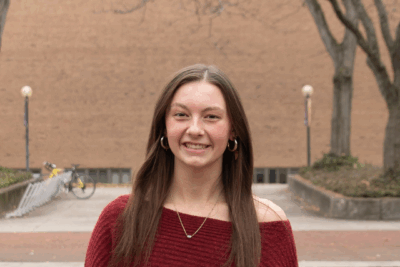Hope you all had a wonderful Takes-giving, a happy Genocide Day, a great NoThanks-NoGiving Day.
A nice day of pretending to be thankful right up until the moment you rush off to compete with other good ol’ American consumers to buy things you don’t need.Don’t get me wrong, I too used to love the electric bustle of Black Friday shopping. And of course, I cherish the few days of the year where I spend time with my whole family, eating and sharing stories.
But the questions need to be asked: why set aside only one day a year to be thankful for what we have? Why wait for government-sanctioned holidays to spend quality time with loved ones?
More importantly: why do we still recognize a holiday that idealizes the genocide of Native people?
The holiday wouldn’t be so bad if the US were making reparations for the past, beginning with treating Native people as human beings. But let’s face the facts: Native people and other minority groups are currently treated poorly at the hands of the US government.
Remember Standing Rock, the indigenous pipeline resistance camp that some Goshen students went to last year? At this time in North Dakota last year, Native people and allies were brutalized by police, pepper sprayed, psychologically intimidated, held in dog cages, shot with sound grenades and water cannons, arrested, and ultimately displaced simply for living on treaty land; for protecting the land and water to prevent oil spills and climate change.
So you see, that’s why for many Native people, Thanksgiving is a day of mourning.
This year on NoThanks-NoGiving Day, I traveled with Erica Ewing and an uncle of ours who I met at Standing Rock to a pipeline resistance camp in Minnesota, Camp Makwa. Camp Makwa is an Anishinaabe-led group of water protectors dedicated to shutting down the construction of the Enbridge Line 3 oil pipeline. Protectors at this camp will stay at least until April when the Public Utilities Commission of Minnesota will approve or deny the pipeline.
At Camp Makwa, snow crunched under our feet when we hopped out of the car after a 12-hour drive. My heart skipped when I saw echoes of Standing Rock- the winding road, the tents, yurts, teepees, RVs, and wooden structures, the faces I hadn’t seen for a year. I was home. After sipping warm coffee, we met new folks and oriented ourselves to the camp.
At camp, the suffocating busyness and callous rationality of Goshen College culture aren’t allowed. You take breaks, you cherish each other’s company, you find ways to care for the community, you directly challenge not only the pipeline but capitalism at its core. You can gather the skills humans need to thrive, ones most of us have forgotten in this society.
Joyously we washed dishes, played with puppies, cooked, built shelters, and sat around a warm fire. Appropriate jokes about injustices are thrown into most conversations because, well, laughter is medicine. Camp is a place to heal wounds so they don’t pound out more violence. Each moment isn’t something to get through, but a gift of passion and purpose. At the end of the day, I watched the sunset and wondered why I miss more sunsets than I catch.
Many of my indigenous brothers and sisters express gratitude deeply and every day through action, prayer to the Creator, by living close to the Earth, and offering respect to all life. I’ve seen that gratitude isn’t merely voicing what you’re thankful for, but it’s fighting for justice, protecting living beings, air, water, and land even while risking our comforts, safety, and lives. Our time and energy can be gifts to all life and future generations.
On the long drive back to Goshen, as I sang my heart out to stay awake, the glow I felt at camp dimmed. I felt empty, detached from what matters. What will I do to remain thankful in a place that socializes me to be ungrateful?
Maybe some of you struggle with this issue too.
If so, here are some possibilities:
Paint your heart out- make art. Don’t give me that “I’m not an artist” crap. You are, embrace it. Art grounds you, lifts you.
Pray. With body and soul.
Run, dance, be outside. Those who’ve passed on are in the wind, they’ll carry you.
Don’t take food and water for granted. Fight for those who don’t have access. When you cook and eat, reflect on where your food came from- find out, or imagine. Send those people and places good vibes- they put energy to bring that to your plate, prepared that food with a lot of love or pain. And share your food!
Show up, stand up, when your community needs support.

